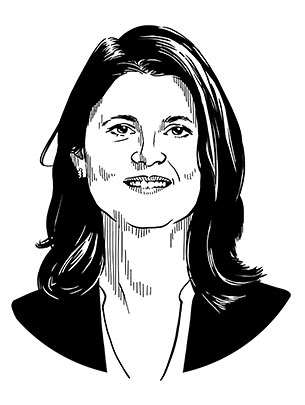What is good development policy, Andrea Franc?
Text: Andrea Franc
Would gaining free access to northern markets help the South economically? And how can developing countries secure functioning institutions? Two contributors discuss how the effectiveness of development aid could be improved.
Fair Trade is the title of a recent book by Joseph Stiglitz, holder of the Nobel prize for economics. However, nowhere in it does he mention the fair trade label that appears on so many packets of coffee in Switzerland. For economists, fair trade is about the North opening up its markets to the South completely, rather than just importing tropical commodities that it cannot produce itself. Stiglitz’s colleague, Paul Collier, actually sees the fair trade label as harmful, as it locks the South into producing tropical commodities instead of diversifying its economy. Development agencies should therefore be fighting not for the fair trade label but to open up the economy of “Fortress Europe”.
Why do development agencies today campaign for small farmers and coffee beans, rather than market access and industrialization? From an economic history perspective, it is interesting to note that this gulf between academic economics and the Third World movement appeared only in the 1980s. When professional non-governmental organizations first came on the scene, they adapted their notion of fair trade to the social context.
To survive or even grow, development agencies had to keep up the flow of donations and to enter into informal alliances with the environmental movement or the trade unions, for example. The organic farming movement, which was very strong in Switzerland, launched its own label, the Bio Bud, as early as 1981. Today, environmental protection and opposition to growth are integral to the fair trade brand, which was introduced in Switzerland by various development agencies in 1992.
The peasant farmer, both at home and abroad, came to symbolize the new concept of organics and fair trade. However, the corollary of this was that the political demand for Switzerland to open up its markets to all southern products and to allow the South to industrialize fell by the wayside. As a number of political-economic studies have shown, unfortunately environmental protection and opposition to growth have often been used in international trade policy as a pretext for shoring up the privileges of “Fortress Europe”. In this process, the NGOs have played the role of “useful idiots”.
Switzerland’s first fair trade product, launched in 1973, had nothing to do with peasant farmers – on the contrary. Ujamaa instant coffee from Tanzania was an industrial product that was seen as fair precisely because it was not an unprocessed commodity and came from a modern factory in Africa. The coffee was sold at stalls all over Switzerland by volunteers with a background in economics, who handed out leaflets with it.
Their aim was not to achieve sales but to “raise awareness” among the population. Switzerland needed to get used to the fact that “in future it would have to give up certain privileges”. Ujamaa coffee would replace Nescafé; jobs and company headquarters would relocate to Africa.
In order “to change the economic structures of our country to reflect our shared responsibility for the world of tomorrow”, Switzerland would have to abolish import tariffs and other trade barriers for developing countries and open up its market not just to tropical commodities but to industrial products. By the same token, developing countries would be allowed to build up their processing industries by using import tariffs to protect their markets, unlike the West. However, Ujamaa instant coffee was the first and last industrially manufactured fair trade product to come from Africa.

